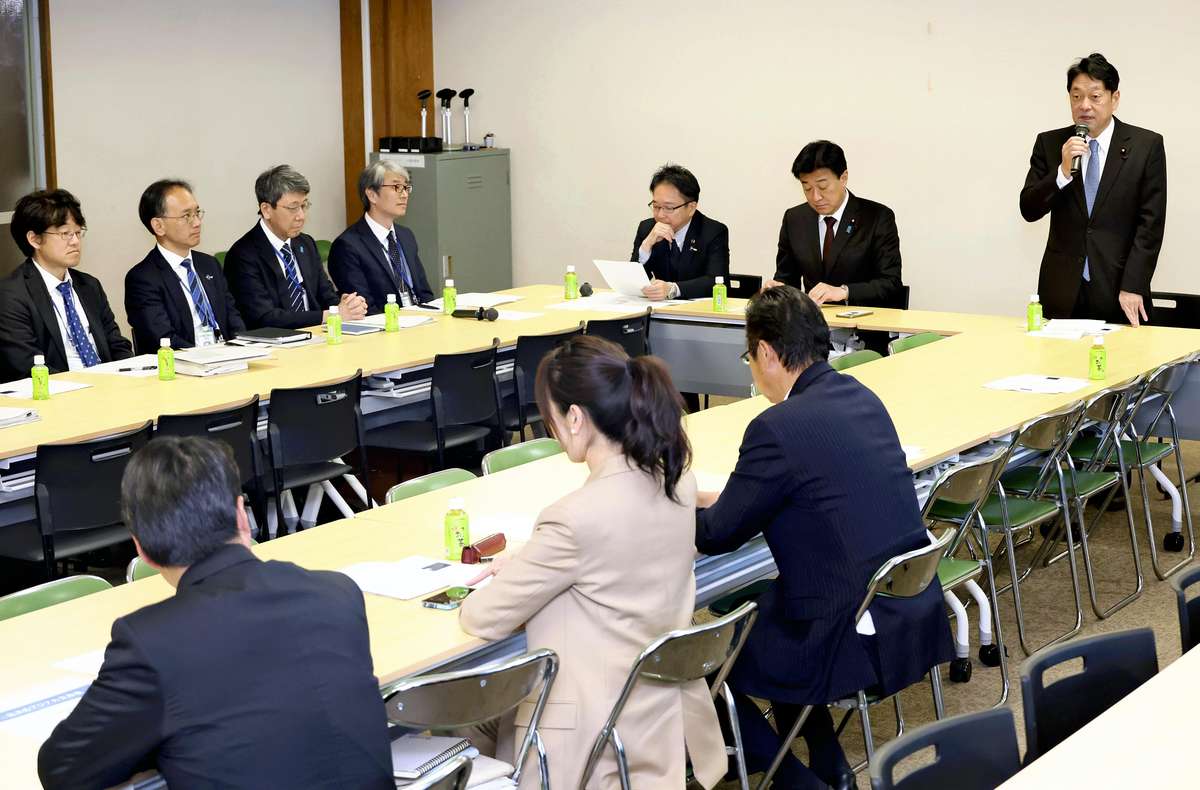LDP Committee Starts Discussions on Ishiba’s Vision of an Asian NATO; Some Party Members Reluctant to Support Measure

Liberal Democratic Party Policy Research Council Chairperson Itsunori Onodera, right, addresses the first meeting of a committee on security in Asia at LDP headquarters on Thursday.
15:13 JST, November 29, 2024
A Liberal Democratic Party committee has started discussions on security issues including the formation of an Asian version of the North Atlantic Treaty Organization, but many members of the party are reluctant to get behind a concept they consider a pet project of Prime Minister Shigeru Ishiba.
The special mission committee likely will need to seek out points of compromise in its discussions while allowing Ishiba, who also is LDP president, to maintain face.
Senior members of the committee, which is tasked with considering security issues in Asia, held their first meeting at LDP headquarters on Thursday. LDP’s Policy Research Council Chairperson Itsunori Onodera, who chairs the committee, indicated that the body would take its time with the discussions.
“These aren’t issues that can be addressed and resolved in a single day,” Onodera said. “It’s important that we thoroughly and steadily discuss them.”
The special committee was established after Ishiba instructed Onodera to launch intraparty discussions on this issue following the launch of his first Cabinet in October. The committee plans to listen to the opinions of experts and accumulate information from other sources, and then compile recommendations for the prime minister.
The Asian NATO concept has been championed by Ishiba for 20 years. During the LDP presidential election in September, Ishiba declared that forming a collective security framework in Asia was an “urgent” issue.
However, opposition to this concept has emerged since the presidential election. These critics point out that an Asian NATO could provoke China, and that making the envisioned security mechanism a reality would require amending the Constitution and taking other steps to allow the nation to fully exercise the right of collective self-defense.
Ishiba has acknowledged these opinions. Since becoming prime minister, he has kept discussions on the issue within the party. Ishiba has not raised the Asian NATO concept during his official trips abroad, instead maintaining a cautious approach.
The LDP, that has been entrusted by Ishiba to handle the issue, also is paying close attention to the direction that the incoming administration of U.S. President-elect Donald Trump will take when he returns to the White House in January. During his first administration, Trump hinted at pulling the United States out of NATO and often took a dim view of multilateral cooperation.
The recommendations the committee will compile could feature wording that attempts to please all sides, in a bid to avoid having any impact on Japan-U.S. ties and other existing diplomatic policies. The committee on Thursday reportedly did not offer any direct opinions on an Asian NATO or any other issue on the agenda, and spent the entire meeting conducting an overarching discussion on security in Asia.
“Discussions in the party’s National Defense Division have been sufficient,” an LDP source said.
After the meeting, Onodera told reporters, “Rather than focusing on issues such as an Asian NATO, I hope we can find a direction on what kind of security will be important.”
Top Articles in Politics
-

Japan PM Takaichi’s Cabinet Resigns en Masse
-

Sanae Takaichi Elected Prime Minister of Japan; Keeps All Cabinet Appointees from Previous Term
-

Japan’s Govt to Submit Road Map for Growth Strategy in March, PM Takaichi to Announce in Upcoming Policy Speech
-

LDP Wins Historic Landslide Victory
-

LDP Wins Landslide Victory, Secures Single-party Majority; Ruling Coalition with JIP Poised to Secure Over 300 seats (UPDATE 1)
JN ACCESS RANKING
-

Producer Behind Pop Group XG Arrested for Cocaine Possession
-

Japan PM Takaichi’s Cabinet Resigns en Masse
-

Japan Institute to Use Domestic Commercial Optical Lattice Clock to Set Japan Standard Time
-

Man Infected with Measles Reportedly Dined at Restaurant in Tokyo Station
-

Israeli Ambassador to Japan Speaks about Japan’s Role in the Reconstruction of Gaza























